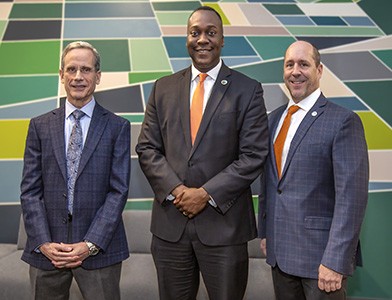
Newswise — Municipalities across the world are increasingly leveraging technology and innovation to offer new services and economic opportunities to meet the needs and expectations of citizens and residents. The Howard County Economic Development Authority (HCEDA) is collaborating with the Johns Hopkins Applied Physics Laboratory (APL), in Laurel, Maryland, to plan and implement a smart and connected community concept within Howard County’s Gateway District.
A memorandum of understanding (MOU) signed in April includes provisions for autonomous systems, clean and sustainable energy, population health and cybersecurity concepts that support the advancement of the county objectives and APL’s research goals.
“We are excited to work together with Howard County on its vision for the future,” said APL Director Ralph Semmel. “The county’s goals for intelligent technologies, technology ecosystems, sustainability and equity will bolster the new Innovation District and keep Howard County among the top places in our nation to live and work.”
APL and HCEDA plan to use the Columbia Gateway Innovation District as a proving ground for their smart city concepts. In its updated HoCo by Design — the document that guides land use, growth and development decisions — Howard County has positioned the more than 900-acre business park as a future mixed-use activity center that will incorporate sustainable development and smart-community practices.
“The goal of Gateway’s future Innovation District will be to reach its highest and best use with a foundation of sustainable infrastructure in clean food, energy, water and transit rooted in economic prosperity and affordability,” said Larry Twele, CEO of HCEDA. “The APL-HCEDA MOU provides a new and exciting opportunity for collaboration in research, planning and commercialization for the district.”
In April, the stakeholders held the first “knowledge exchange” under the MOU to advance understanding of Howard County’s priorities and options for planning infrastructure and technical solutions to meet economic growth, equity and sustainability objectives.
“The biggest problem for smart cities is engaging the community members to learn what their challenges are, as opposed to deciding what’s best for them,” noted Cara LaPointe, an APL program manager and co-director of the Johns Hopkins University Institute for Assured Autonomy, a national center of excellence for artificial intelligence (AI) and smart autonomous systems.
APL is leading an initial project to help Howard County identify stakeholders and engage them from the outset. Stakeholders attending the knowledge exchange included several developers in the county, including the Howard Hughes Corporation, the Abrams Development Group and Corporate Office Properties Trust. Administrator Christine Nizer from the Maryland Department of Transportation’s Motor Vehicle Administration attended and spoke about the state’s efforts in embracing connected and automated vehicle technology.
“Because smart cities could involve thousands of autonomous systems operating in concert in densely populated areas, it is challenging to create smart and connected communities in a way that is both assured and equitable,” said Gregory Falco, an assistant professor in the Johns Hopkins University Department of Civil and Systems Engineering and the Institute for Assured Autonomy, where he holds an appointment at APL.
Falco, who has been at the forefront of smart-city security and safety in both industry and academia for the past decade, talked about lessons learned in working with communities across the globe on creating smart cities.
APL and HCEDA plan to work with the county and other key stakeholders to address a variety of possibilities, such as:
- Applying novel technologies to make energy consumption in the Gateway District buildings more efficient and to make energy resources more available, secure and capable of meeting the needs of the community;
- Determining how emerging autonomous transportation systems can safely improve mobility and ensure access for all;
- Devising standards and controls that support all members of the community as intelligent systems become more prevalent; and
- Learning from the pandemic to improve health awareness and access.
“We are entering a new era of transformation in which residents and their surrounding environments are increasingly connected through intelligent technologies,” said Howard County Executive Calvin Ball. “This transformation will improve well-being and prosperity for all. With our colleagues at the Johns Hopkins Applied Physics Laboratory, we will explore ways to improve safety, mobility and sustainability in the county through innovation.”
The Applied Physics Laboratory, a not-for-profit division of The Johns Hopkins University, meets critical national challenges through the innovative application of science and technology. For more information, visit www.jhuapl.edu.